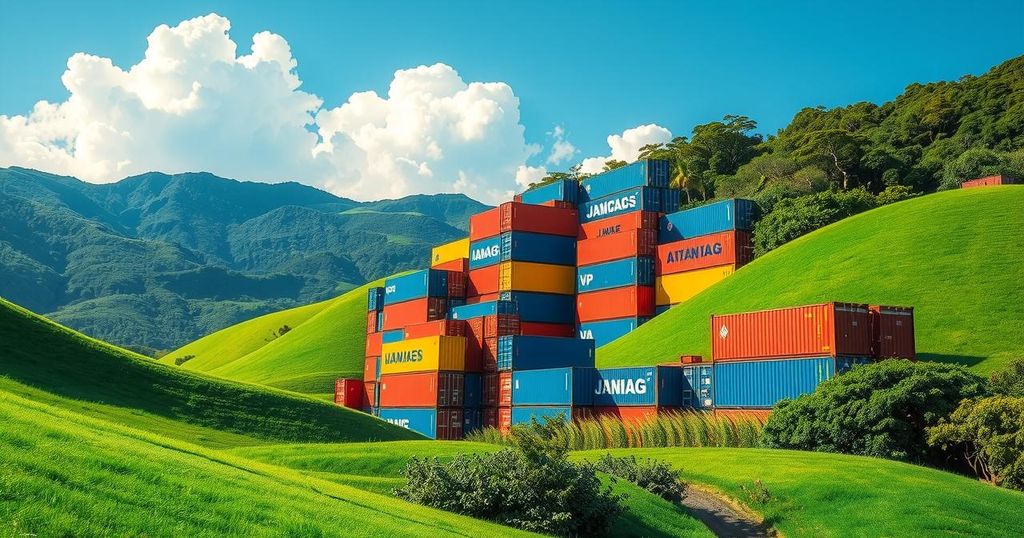US Tariffs on Aluminium: Implications and Opportunities for Jamaica

The US has imposed a 25% tariff on imported aluminium, aiming to revive its domestic smelting industry. Economists warn of potential drawbacks, including higher costs for industries relying on aluminium and possible retaliatory actions. Conversely, Jamaica, a key alumina supplier, may benefit from these tariffs, positioning itself strategically in the global market if it enhances its production capabilities. Decisions made by policymakers will be crucial in capitalizing on this scenario.
The recent imposition of a 25 percent tariff on imported aluminium by the United States government is perceived as a well-intentioned yet potentially misguided economic decision. While it aims to stimulate the domestic aluminium smelting industry, many economists warn it may adversely affect industries reliant on aluminium, increase consumer costs, and provoke retaliatory measures from trade partners.
Jamaica, as a primary supplier of alumina—an essential component in aluminium production—stands to benefit from such shifts in global trade dynamics. The current scenario may favor Jamaican alumina, as the US industry continues to grapple with structural competitiveness issues due to high energy costs associated with aluminium production.
Aluminium smelting is notably energy-intensive, and US competitors from countries like China and Canada benefit from lower electricity rates. Despite tariffs, the US aluminium sector remains uncompetitive, reliant on imports for necessary materials such as alumina. Historical production rates illustrate this decline, with US output decreasing dramatically from 5 million metric tons annually to under 1 million metric tons today.
The ongoing tariffs may do little to rejuvenate the US aluminium smelting industry, with only potential minor re-openings of idled smelters anticipated. Furthermore, significant investment is required for any new smelting operations, as evidenced by Century Aluminum receiving substantial funding under the Biden administration to establish a new facility.
The broader implications of these tariffs indicate that aluminium-utilizing sectors—such as automotive, aerospace, construction, and beverage packaging—will likely experience increased production costs, ultimately affecting consumers. Consequently, many businesses may consider outsourcing production to mitigate these rising expenses.
The motivations behind the tariffs include attempting to rectify trade imbalances, bolster national security, and generate additional revenue. Nevertheless, the anticipated $4 billion revenue could be overshadowed by losses elsewhere in the economy, particularly in manufacturing.
Conversely, this policy may present Rio Jamaica’s bauxite and alumina industry with an unexpected advantage. Given that US aluminium production requires significant amounts of alumina, Jamaica’s historical trade ties position it favorably to continue supplying this essential input amidst geopolitical uncertainties involving China.
The future of Jamaica’s Alpart refinery, currently owned by JISCo, appears uncertain, particularly in the face of US-China tensions. Upgrading Alpart—or alternatively attracting new investment and restarting operations—represents a strategic opportunity for Jamaica. A past example includes former Prime Minister Edward Seaga orchestrating a rapid reopening of the Jamalco refinery, demonstrating the necessity of decisive government intervention to tap into current market circumstances.
Ultimately, while the US tariffs may impose burdens on its smelters, they create a rare opportunity for Jamaica to enhance its standing in the global alumina market. Policymakers must adopt a strategic vision to capitalize on this situation, transforming a flawed trade policy into a beneficial outcome for the Caribbean region.
In summary, the recent tariffs imposed by the United States on imported aluminium present both challenges and opportunities. The potential negative repercussions for the US aluminium smelting industry may paradoxically benefit Jamaica’s alumina supply sector. Policymakers in Jamaica must act decisively to leverage this opportunity, ensuring investments in infrastructure and operations to solidify the country’s position in the global market. A strategic approach could transform the implications of U.S. trade policy into a significant gain for Jamaica.
Original Source: jamaica-gleaner.com




